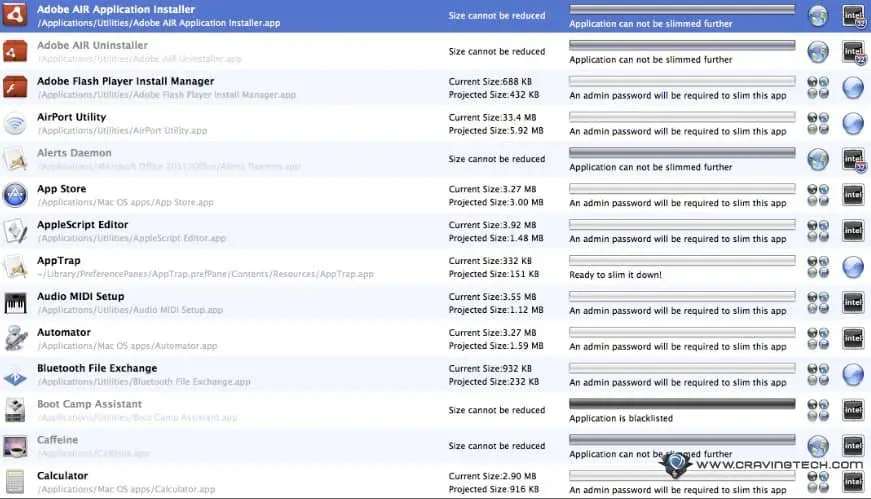
- Xslimmer mac free full#
- Xslimmer mac free software#
- Xslimmer mac free code#
- Xslimmer mac free Bluetooth#
- Xslimmer mac free free#
Clean Out ‘Other’ System Preferencesĭon’t close System Preferences yet! Take a peek in the bottom section of your System Preferences window, labeled Other. If you’re using a PowerBook or iBook, this may also improve battery life. This will save you some valuable RAM and processor resources. If you don’t use these features, verify that they are turned off.
Xslimmer mac free Bluetooth#
Some, however, may not be useful to you, such as Universal Access (which offers help for visually and hearing impaired users) or Bluetooth (which allows certain devices to be used wirelessly). Apple has generously included a number of very useful features as preferences. While System Preferences is open, take a look at a few other things. Turn Off Universal Access, Bluetooth, Speech Recognition, and Internet Sharing if You Don’t Use Them However, be sure that you know what you’re removing otherwise you may kill some critical function for the next time you restart. To remove them, simply select the item by clicking on its name and then hit the “minus” button at the bottom of the list. You may be surprised at how many there are. You can find out what is in your startup items list by navigating to Apple Menu > System Preferences > Accounts > Login Items. Some applications automatically (or when asked) set themselves as a Login Item, which causes them to open at every restart or login. These are tips for getting the most out of the Mac you currently have without investing in hardware upgrades.
Xslimmer mac free full#
They mostly have to do with reducing memory use by limiting the number of active processes and freeing up drive space, since a too full drive (especially past the 90% mark) can slow down your Mac. Publisher’s note: None of these tips will improve your Mac’s performance as much as more system memory (RAM), a faster hard drive, or a CPU upgrade, which isn’t always possible. Here are a few tips I’ve found for restoring my Macs to full speed without spending a penny. When those don’t speed things up, I’ve found a number of things I can do to encourage my Macs back to their youthful snappiness. This alone will bog down any Mac.Īt other times, I realize that it’s been weeks since I restarted the computer, and a simple restart will solve a lot of these woes. There are many potential reasons why: I tend to run 8 to 10 applications all the time – and sometimes push 15 or more. If you find Ed’s articles helpful, please consider making a donation to his tip jar.Įvery now and then, my Macs begin to feel a little sluggish.We hope to add similar articles covering later versions of OS X. Most of these tips apply to Intel-based Macs running Tiger, but we specifically address G3, G4, and G5 PowerPC Macs, since Intel Mac users really should be using something newer than Tiger by now (we love OS X 10.6 Snow Leopard, the last version before OS X became heavily influenced by iOS). It was written toward the end of the Mac OS X 10.4 Tiger era and has been updated since its first publication. I know because my Mac Mini swaps all the time using 4GB.Publisher’s note: This article, originally written by Ed Eubanks Jr and published on 2007.03.12, has been the most popular article in the history of Low End Mac with well over 2 million hits.
Xslimmer mac free software#
And if your system really only (yes, only) has 4GB of memory, you are going to cause yourself out of memory problems, or software crashes. I'm just saying that usually this is not a good idea. I'm not trying to sound condescending, you may know more about Swap files than I do (you may have invented them). I have years of experience and decided to shut off my Swap temporarily. Now there are some exceptions to this, I have 16 GB of RAM and didn't Swap once in 30 days. It's actually not a great idea to turn off your swap. Programs may use hard drive space for other functions (auto saving is an example). You need to either remove unused programs, remove (or compress) unnecessary data files, or increase the size of your HD. Quite honestly, this is not a "problem" (per se). Since material is pulled from the local disk, it "speeds up" the page view. So Chrome (and other web browsers) cache to your hard drive. They go to websites they are familiar with. Most people don't spend all day going to new websites. That's part of what it does to "speed up" page viewing. Depending on the number of Apps you have installed you may only see another couple Gigs freed up.Ĭhrome is caching websites to your disk.
Xslimmer mac free code#
It delocalizes AND gets rid of the "Universal" code that isn't used by Intel processors.

Xslimmer mac free free#
First, if you want to free up some more space, I used xSlimmer.


 0 kommentar(er)
0 kommentar(er)
